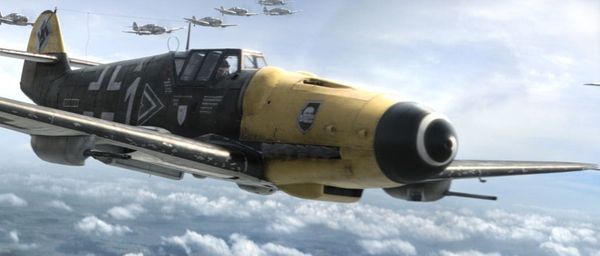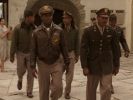Eye For Film >> Movies >> Red Tails (2012) Film Review
Red Tails
Reviewed by: Andrew Robertson

Italy, 1944. The air war in Europe is entering its latter stages. Far to the north, daylight bombing groups are pushing ever further into Germany, but there are other conflicts. In the Pentagon there is contention over the role of black aviators, and for each of the Tuskegee Airmen there are internal struggles. More than that, though, in Red Tails there is a fascinating chapter of military history and the civil rights movement, struggling to escape from hackneyed formula.
Opening with a statement that it was "based on true events", Red Tails plays somewhat fast and somewhat loose with history in service of story, but despite liberties with dates and places and names and equipment and nose-art and so on and so forth doesn't manage to free itself from tired convention. It manages that rare trick of being both too short and too long, woodenly dragging its cast through lines that connect dots in the most cursory fashion: "CHARACTER_NAME, your CHARACTER_FLAW is preventing you from achieving CHARACTER_GOAL, but your CHARACTER_STRENGTH is why RELEVANT_ENTITY needs you". Given how many of the effects are done with computers, it's surprising that two scriptwriters are responsible - John Ridley (of Three Kings and U Turn) and Aaron McGruder.

Both have television experience, and while the story of the Tuskegee Airmen has been filmed before there could well have been room for a miniseries - given George Lucas' involvement it could have been pitched as somewhere between The Wire and Band Of Brothers, but with fighter-planes. Lucas' commitment to the project, to the tune of tens of millions of dollars for production and distribution, cannot be doubted, but the worthiness of his vision and the respect the project has are outweighed by one simple, inescapable fact: Red Tails is boring.
It's safe to say it had a troubled gestation - if you count it from Lucas originally pitching the film, it's been 20 years, but pre-production started about 2009. Director Anthony Hemingway has done plenty of television but Red Tails is his film debut. Complicating matters, his commitments to HBO's Treme meant it was Lucas who directed re-shoots, with McGruder brought in to script those segments. It's a relatively solid rule that once a film has started production it will be completed by any means necessary, and it's an even more reliable rule that the more writers (and/or directors) assigned to a project the more likely it is to fail. Red Tails is no exception.
The core cast are good, but hampered by the script and the broad-strokes it uses to characterise their roles. 'Easy' (Nate Parker) is a high-achiever and stickler whose lack of self-belief manifests as a drinking problem. 'Lightning' (David Oyelowo) is a natural pilot and a ladies man, who won't play by the rules. Naturally, they are friends, sharing quarters. 'Junior' wants to be taken seriously, but Tristan Wilds credibly manages to portray a young, married father whose maturity is too easily overlooked behind his talisman of a dime-store Buck Rogers raygun. Elijah Kelley, Kevin Phillips, and Ne-Yo round out the pilot roster. Andre Royo does a good turn as put-upon crew-chief 'Coffee', but the real problems are further up the chain of command.
Cuba Gooding Jr plays the Major in charge of the 332nd, but there's almost nothing to the role. There are opportunities, certainly, but for the most part it seems any form of characterisation at script-level or in performance has been subsumed into fiddling with a pipe. Above him, as Colonel Bullard, Terrence Howard does well responding to Pentagon in-fighting (and racism) but later scenes fall too readily back to "you're the best damn detective/doctor/pilot we have!" cliché, and for all Howard's talent the script just won't be sold.
Fortunately, lots of that Star Wars money was spent on special effects. Lucasfilm come through in spades, the aerial battles are full of subtly matched lighting and shadows on clouds, the same green screens that put Hayden Christiansen into a variety of Jedi fighters are more than able to put the cast behind the controls of P-40 Warhawks and P-51 Mustangs. The assembled bomber flights seem ridiculous, but hundreds of aircraft were not an uncommon sight. The best two engagements are probably Easy's flight attacking a train, one of the best insights into his character and that of wingman 'Lighting'; and the air cover the unit provides for the landings of 'Operation Shingle'.
During that battle the unit acquires its nemesis: German pilots, striking from a hidden base, attack the beach. Leading them is "Pretty Boy", a fighter-ace with a duelling scar and a distinctive yellow-nosed aeroplane. After the dogfight, our heroes follow his damaged aircraft back, inflicting heavy casualties on the Axis airfield. While the Allied landing is vast in scale, it suffers in comparison to the memory of Spielberg's Omaha Beach. The later battles stretch historical credibility - the "red-tail angels" had a good record escorting bomber fleets, but not a perfect one, and while singular engagements with a German Destroyer and a climactic battle with jet-propelled wunderwaffe Me-262s are exciting, the biggest battle for the Tuskegee Airmen wasn't in the air, but on the ground.
While there are scenes in the 'whites-only' Officer's club, inter-racial bonding in Stalag 18, back-room contempt for the 'experiment' in black aviation delivered ably by Bryan Cranston, the most striking thing about the racism is that there just doesn't seem to be enough of it. In the same way that it's surprising in The Red Machine that there's no smoking, the 1940s were a cultural landscape far removed from modern sensibilities. Lightning is able to court an Italian, Sofia, played by Daniela Ruah, but the biggest obstacle to their courtship is that her mother chaperones their first date. There are no white officers among the film's 332nd, though concerns about white men serving under black officers prevented many Tuskegee Airmen from receiving promotions. There's also little mention of the unit's legacy: of the fact that they had integrated training for ground crews, for flight-surgeons; or the role their success played in desegregating US Armed Forces in 1948.
Given space to develop on HBO or similar this could have been brilliant. Crowbarring pedestrian stories of personal issues (who would have expected cockiness among fighter pilots?) into a fictive history seems wasteful. It's hard to tell whether it's the paper-thin characters over the cracks in the historical record, or the wash of 'authenticity' over boiler-plate drama, but for all its soaring ambition the low quality of its construction ensures that Red Tails won't fly.
Reviewed on: 31 May 2012


















